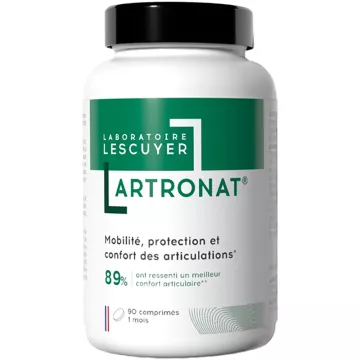Soin-et-nature respects your privacy Our site uses cookies to ensure that it functions properly and to optimise technical performance. For more information information and/or to change your preferences, click on the "Settings" button.




What are the main causes of joint pain?
Joint pain, which affects a growing number of people every year, can be caused by a variety of factors. Among the most common areosteoarthritis, manifested by the breakdown of joint cartilage, and rheumatoid arthritis, an autoimmune disease characterized by chronic inflammation. Other factors such as sports injuries, infections such as septic arthritis, and conditions such as gout and fibromyalgia also contribute to joint pain.
How can joint pain be prevented?
Preventing joint pain starts with adopting a healthy lifestyle. Maintaining an optimal body weight is recommended to reduce pressure on weight-bearing joints such as the knees and hips. A diet rich in natural anti-inflammatories such as omega-3s, found in oily fish, and antioxidants found in fruit and vegetables, can also help.Regular exercise, such as swimming or cycling, is essential to strengthen the muscles around the joints and maintain their functionality.
What treatments are available for joint pain?
Treatment for joint pain varies according to the cause. Options include drugs such as non-steroidal anti-inflammatory drugs (NSAIDs), analgesics and, for more severe cases, corticosteroids. Physical and occupational therapies are often recommended to improve mobility and reduce pain. In some cases, surgical interventions such as joint replacement may be necessary to restore function to the damaged joint.
How does modern technology help manage joint pain?
Technological advances have greatly improved the management of joint pain. Telemedicine enables patients to consult specialists without having to travel, which is particularly beneficial for those with mobility difficulties. Mobile applications that track nutrition, physical activity and pain management offer personalized tools for managing symptoms. In addition, innovations in prosthetics andsmart implants offer more durable solutions tailored to individual needs.
What role does diet play in managing joint pain?
A balanced diet plays a crucial role in managing and preventing joint pain. Foods rich in vitamin C, such as citrus fruits and green vegetables, promote healthy cartilage. Anti-inflammatory foods, such as turmeric and ginger, can reduce joint inflammation. It is also advisable to limit consumption of pro-inflammatory foods such as refined sugars and saturated fats, which can aggravate inflammation and pain.
What exercises are recommended to relieve joint pain?
To relieve joint pain, certain low-impact exercises are particularly beneficial. Swimming, aqua aerobics and cycling allow you to move your joints without overloading them. Muscle-strengthening exercises, such as those using elastic bands or light weights, help to support and protect joints by strengthening the surrounding muscles. Flexibility and stretching exercises are also recommended to maintain range of motion and reduce stiffness.
Can dietary supplements help manage joint pain?
Yes, some dietary supplements are known for their potential to relieve joint pain. Glucosamine and chondroitin are among the most popular, often used for their ability to help rebuild cartilage and lubricate joints.Krill oil andfish oil are rich in omega-3s, recognized for their anti-inflammatory properties. It is important to consult a physician before starting any supplement, especially if you have pre-existing medical conditions or are taking other medications.
How does climate affect joint pain?
Many people report an increase in joint pain with climate change, particularly when it's cold or damp. Although the exact mechanisms are not fully understood, it is thought that changes in barometric pressure can cause tissues around the joints to expand or contract, increasing pain. Colder temperatures can also make synovial fluid denser, reducing joint lubrication and increasing stiffness and pain.
What impact does stress have on joint pain?
Stress can have a significant impact on joint pain. It is known to exacerbate inflammation in the body, which can increase joint pain. In addition, stress can lead to muscle tension, which can aggravate joint pain and stiffness. Stress management techniques, such as meditation, yoga and deep breathing exercises, can be beneficial in reducing the impact of stress on joints.
What recent medical innovations are helping to treat joint pain?
Technological advances have led to new approaches to treating joint pain. Biological therapies, for example, use biological agents to reduce inflammation and target specific processes in autoimmune diseases such as rheumatoid arthritis. Stem cell therapy also offers promising prospects, with the potential to regenerate damaged cartilage. In addition, advanced imaging technologies are improving diagnosis and treatment planning, enabling more targeted and effective interventions.